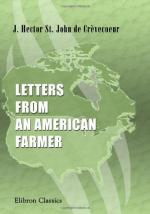disturbed by that accursed spirit given them by the
wood rangers in exchange for their furs. If my
children learn nothing of geometrical rules, the use
of the compass, or of the Latin tongue, they will learn
and practise sobriety, for rum can no longer be sent
to these people; they will learn that modesty and
diffidence for which the young Indians are so remarkable;
they will consider labour as the most essential qualification;
hunting as the second. They will prepare themselves
in the prosecution of our small rural schemes, carried
on for the benefit of our little community, to extend
them further when each shall receive his inheritance.
Their tender minds will cease to be agitated by perpetual
alarms; to be made cowards by continual terrors:
if they acquire in the village of—–,
such an awkwardness of deportment and appearance as
would render them ridiculous in our gay capitals,
they will imbibe, I hope, a confirmed taste for that
simplicity, which so well becomes the cultivators of
the land. If I cannot teach them any of those
professions which sometimes embellish and support
our society, I will show them how to hew wood, how
to construct their own ploughs; and with a few tools
how to supply themselves with every necessary implement,
both in the house and in the field. If they are
hereafter obliged to confess, that they belong to
no one particular church, I shall have the consolation
of teaching them that great, that primary worship
which is the foundation of all others. If they
do not fear God according to the tenets of any one
seminary, they shall learn to worship him upon the
broad scale of nature. The Supreme Being does
not reside in peculiar churches or communities; he
is equally the great Manitou of the woods and of the
plains; and even in the gloom, the obscurity of those
very woods, his justice may be as well understood and
felt as in the most sumptuous temples. Each worship
with us, hath, you know, its peculiar political tendency;
there it has none but to inspire gratitude and truth:
their tender minds shall receive no other idea of
the Supreme Being, than that of the father of all men,
who requires nothing more of us than what tends to
make each other happy. We shall say with them,
Soungwaneha, esa caurounkyawga, nughwonshauza neattewek,
nesalanga.—Our father, be thy will done
in earth as it is in great heaven.
Perhaps my imagination gilds too strongly this distant prospect; yet it appears founded on so few, and simple principles, that there is not the same probability of adverse incidents as in more complex schemes. These vague rambling contemplations which I here faithfully retrace, carry me sometimes to a great distance; I am lost in the anticipation of the various circumstances attending this proposed metamorphosis! Many unforeseen accidents may doubtless arise. Alas! it is easier for me in all the glow of paternal anxiety, reclined on my bed, to form the theory of my future conduct, than to reduce my schemes into practice. But




